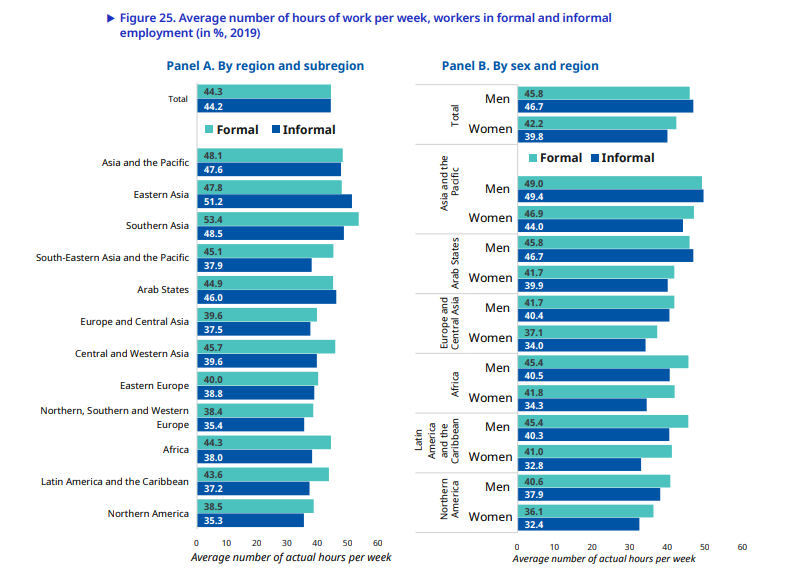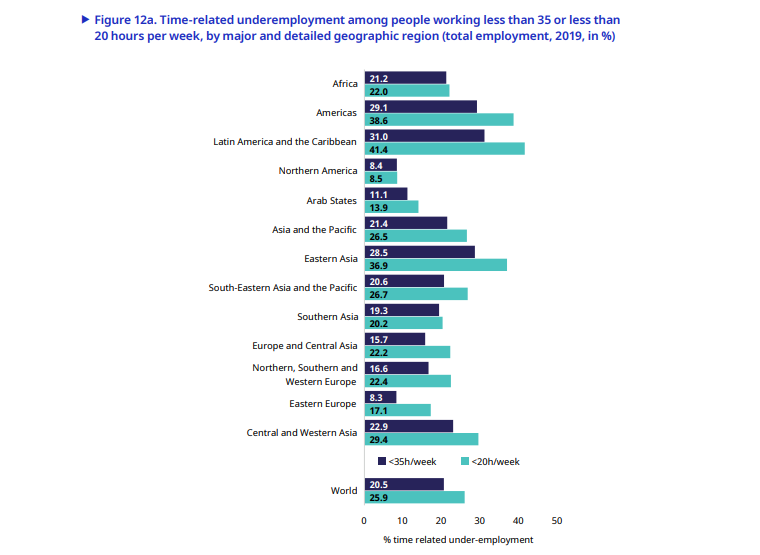A global study applied by the ILO concluded that the new, more flexible work modalities originated as a result of the covid-19 pandemic have a positive impact on the health and performance of workers. The report highlights Venezuela as one of the countries in which there is a greater gap, mainly due to the excessive number of hours worked
New labor trends are leaning towards experimentation with new non-traditional work schedules, usually aimed at providing greater flexibility for employees, which according to a study carried out by the International Labor Organization (ILO), released on January 6, show have a positive impact for economies, companies and workers.
A report called Working time and the balance between work and private life in the world points out that a better balance between time for work and personal life usually generates benefits in productivity and work performance, dismantling the work modalities that arose hand in hand with the industrial revolution.
The ILO study emphasizes that the solution is not simply to reduce or increase working hours, which is why this work with surveys in dozens of countries from all regions of the world sought to explain precisely what are the best dynamics to define the new working hours trends.
The surveys showed that there are gaps between the expectations of workers and the hours they must work. This applies both for very long hours and for those that are too short for the needs of the employees, depending on the modality under which they work.
The report highlights Venezuela as one of the countries in which there is a greater gap, mainly due to the excessive number of hours worked. According to ILO standards, 24.5% of the population —one fifth of the country’s labor force— manifests an excess of hours with respect to those they would prefer to work, even if this has an impact on a salary decrease corresponding to the hours they would prefer to work. remaining hours, in line with the Latin American average, since in the region 26.4% feel that they are working more than they should.
According to ILO figures, the average weekly hours worked by formal employees in Latin America is 43.6, slightly above the 40 weekly hours established by the ILO as a standard. By way of contrast, in North America the average is 38.5 hours per week. Although it is not the region with the highest workload, as South Asia averages 53.4 hours per week.

short hours
Problems don’t just go hand in hand with long and demanding hours. On some occasions, there are also disagreements on the part of workers who are paid by the hour or who have part-time shifts.
These types of work are usually related to the forms of contracting, since in many cases they are jobs freelancing that result in different disadvantages compared to traditional employment, since benefits that are required by law are not usually included.
*Read also: Lack of definition of the labor situation in delivery keeps workers trapped
In this sense, short days, less than 35 hours per week or less; or the very short ones, considered from 20 working hours or less, also cause gaps on the part of workers who want more hours of work to earn more money.
The surveys applied by the OIT allowed us to determine that in Latin America 31% of workers with days of less than 35 hours a week and 41.4% of employees who work less than 20 hours feel a gap because they feel the need to dedicate more hours at work.

ILO recommends midpoint
The ILO stresses that it is important to find a middle ground that allows workers to balance their workdays with their personal lives.
Thanks to the covid-19 pandemic and the mobility restrictions that forced the implementation of modalities such as teleworking or partial hours, a step was taken in the right direction in the application of formulas that allow finding the right balance, by granting flexible hours workers without harming productivity.
“A better work-life balance is one of the results of many of these modalities and brings significant benefits to both employers and employees. It is important to identify the balances between personal life and work resulting from each agreement related to working hours, “underlines the ILO.
*Read also: They extend until December 2024 the “violated” labor immobility
Pursuing this idea, the report proposes a series of conclusions drawn from the study, among which are:
- The classic standard work week (8 hours a day, five or six days a week) provides stability to
workers in planning their lives, however, such fixed schedules are often too inflexible to honor the time demanded by the family as and when necessary. - Shift work can provide workers with greater schedule flexibility to help them balance work and non-work commitments. However, it may require them to work atypical hours, which has been linked to significant health risks and disruption to family life.
- Part-time work (less than 35 hours per week) with predictable work schedules allows workers more time for personal responsibilities and recreational activities, leading to a better paid work-life balance.
- On-call work, based on highly unpredictable “just in time” schedules, severely disrupts work-life balance by making it difficult for workers to organize their personal lives and finances. It has also been shown to have negative effects on the health of workers.
- Flexible hours allow workers to organize their own work schedules based on their individual needs, within set parameters, in order to optimally balance their paid work and personal commitments.
- Compressed work weeks give employees longer weekends to spend with family and friends, thereby improving work-life balance; there is debate about its impacts on health, but the evidence tends towards positive effects.
- Modalities that average hours over short or medium time frames can facilitate work-life balance; however, if they are poorly designed and implemented, employees can be left vulnerable to drastic changes in work hours that disrupt their personal lives.
Also read: Work: more attractive, productive and human, by David Somoza Mosquera
Post Views: 203















